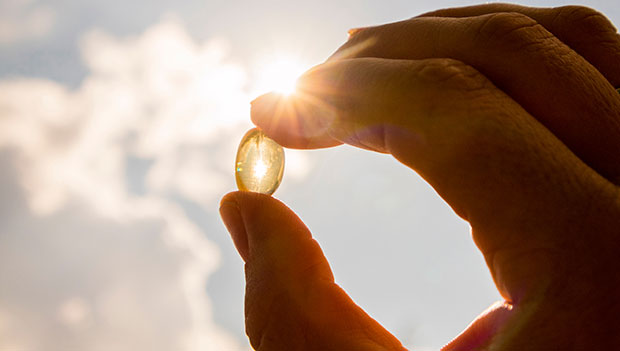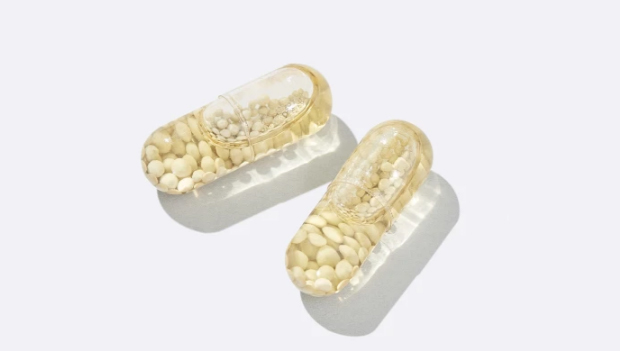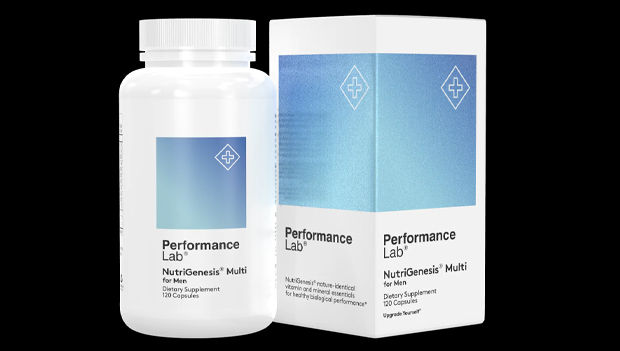
Taking strides toward improving your nutrition can be a major factor in improving your health and wellness. It's more than just the intake of fats, proteins, and carbohydrates.
Making the right choices regarding micronutrients—essential vitamins and minerals such as iron, copper, and B12 are just as valuable. Of the many nutrients your body needs, few are as important (and overlooked) as Vitamin D. As a follow-up to our roundup of the best Vitamin D supplements on the market; we wanted to take a closer look at the benefits of taking vitamin D.
What is Vitamin D?
This fat-soluble vitamin carries a range of benefits for proper body development, function, and longevity. It is critical in helping to absorb and put to use calcium and phosphorus, two components of healthy bone growth.(1)
When exposed to direct sunlight, your body can produce Vitamin D and derive more from foods like salmon, tuna, and egg yolks. Making sure your body has enough Vitamin D helps your body's growth and development and may decrease the risk of disease. For a more in-depth look at the benefits of this nutrient, stick around until the end of this article.
How to Get Enough Vitamin D
Health professionals are proponents of deriving Vitamin D from natural sources such as direct sunlight and a nutritious diet. However, some factors may cause your body to become deficient. Situations like a busy lifestyle or living in an overcast, low-sunlight part of the country can reduce your ability to maintain healthy levels.
If you are finding it difficult to get adequate Vitamin D, a dietary supplement may help bridge the gap. Derived from high-quality sources and taken in the right amounts, a supplement may help fill in your body's deficits and unlock benefits that only come from a proper concentration of Vitamin D.
It's hard to navigate through the unlimited number of options out there. To help, our team has used its vast experience to reveal three options that we think are the best Vitamin D supplements currently on the market.
Why Trust Us?
The health and safety of ACTIVE's readers is of the utmost importance to us. To ensure your well-being when consuming dietary supplements, the ACTIVE.com editorial team prioritizes products that are independently tested by a third party. We've consulted with a team of nutritionists and dieticians to ensure the products we feature are of the highest standard. This helps us create the most accurate, authentic review content for our readers.
By clicking on the product links in this article, we may receive a commission fee at no cost to you, the reader. Sponsorships and affiliate commissions help support our research so we can help you find the best products. Read our full affiliate disclosure here.
Transparent Labs Vitamin-D3 with K2

SPECS
- Price: $19.99 per bottle, 0.17 per serving
- Flavor options: N/A
- Serving size: 1 capsule
- Type: Capsule
- Ingredients: Vitamin D3, Vitamin K2
- Certifications: Manufactured in a UDAF GMP-certified facility
While both are in the same family of vitamins, vitamin D3 is a natural form of vitamin D produced from exposure to sunlight. Although they both perform similar functions within the body, there is a strong connection between Vitamin D3 and healthy gene expression.(12)
This Vitamin D3 supplement from Transparent Labs contains 5,000 international units, which is adequate for most people and minimizes the risk of overdoing it. Including Vitamin K2 in this formulation works synergistically with Vitamin D to enhance calcium absorption into the bones while working to keep it out of your body's tissues.
Another reason we like this brand is because of its long track record of high-quality sourcing and manufacturing practices.
What We Like
- High-quality ingredients
- Clean formulation with proper dosages
- Complements Vitamin D through sunlight and food sources
- Budget-friendly
What We Don't Like
- Shipping can take extra time depending on your location
BUY: Transparent Labs Vitamin D3 with K2
Multivitamin with Vitamin-D3 - Ritual

SPECS
- Price: $33.00 per bottle
- Flavor options: N/A
- Dosage: 2 vegan capsules per day
- Type: Capsule
- Ingredients: Vitamin D3, Folate, Boron, Iron, Vitamin K2, Magnesium, Boron, Vitamin E, Omega-3, Vitamin B12
- Certifications: Vegan certified
Being one of the best multivitamins on the market, Ritual is the ideal choice if you're looking for an allergy-friendly, certified-vegan Vitamin D multivitamin. They have meticulous manufacturing practices to ensure that all their products are allergen-free and safe from contamination. The number of certifications impressed us and demonstrates a firm commitment to accountability.
With Vitamin D, each serving comes with 2,000 international units. While it's not as high as Transparent Lab's supplement, we think Ritual's delayed-release capsules may provide an advantage with absorption.
One thing to keep in mind is that this brand is not cheap. The cost per dose is higher than other Vitamin D supplements on the market. However, we feel that the value they deliver justifies the price tag.
What We Like
- Delayed release capsules for better absorption
- Free of major allergens, non-GMO
- Vitamin D is certified vegan
- High-quality ingredients are traceable
What We Don't Like
- One of the more expensive options
BUY: Multivitamin with Vitamin-D3
Multivitamin with Vitamin-D - Performance Lab Nutragenesis

SPECS
- Price: $49.00 per bottle, 0.60 per serving
- Flavor options: N/A
- Dosage: 4 capsules per day
- Type: Capsule
- Ingredients: Vitamin D, Vitamin A, Vitamin C, Vitamin K, Vitamin E, Folate, Vitamin B12, Iron, Biotin, Pantothenic Acid, Magnesium, Zinc, and others
- Certifications: cGMP certified, Non-GMO, NPA certified, Organic certified, UL certified
The focus of this multivitamin with Vitamin D is its maximal absorption. This factor is important for oral supplements since absorption rates can fluctuate based on several factors. Performance Lab Nutragenesis contains the proper amounts of over 17 nutrients, more than most supplements we researched.
It comes with a prebiotic in each capsule along with additional ingredients that may optimize the absorption of its main vitamins, including Vitamin D. As we mentioned earlier, combinations of different vitamins and concentrations can produce a synergistic effect in the body and at 1,000 international units of Vitamin D per serving, this supplement is great if you are looking for a multivitamin that can help fill in the occasional gaps when you need it.
However, if your Vitamin D levels are significantly lower than average, you may consider the Vitamin D supplement from Transparent Labs instead. It's a good idea to consult a doctor in either case.
What We Like
- Provides an adequate amount of Vitamin D
- Includes ingredients that can help improve absorption
- Contains probiotics
- Easy-to-swallow capsules
What We Don't Like
- High cost per serving
- Customer service can take more time to respond
BUY: Performance Lab Nutragenesis
Benefits of Vitamin D
Having healthy levels of Vitamin D can provide many benefits at any age. Besides helping during the development stage, it can be a powerful player as we age. While there is promising data beyond what we will cover, here are some of the most science-backed benefits that Vitamin D may provide.
May Help Improve Cognitive Health
Research shows that low levels of Vitamin D can significantly impair cognitive abilities such as learning, memory, decision-making, and attention. A prolonged deficiency can increase the chances of developing dementia.(2) Healthy vitamin D levels can help your brain work at its best and lower disease risks.
Vitamin D May Help with Mood and Depression
This nutrient might be an important player in regulating mood and decreasing the risk of depression. In fact, a recent study showed that vitamin D even had a positive effect on patients with major depressive disorder. Addressing a Vitamin D deficiency may also help ease symptoms of anxiety in some people.(3)
May Help Improve Sleep
Even though it's called the "sunshine" vitamin, this nutrient may significantly impact sleep quality. Studies show a correlation between proper sleep regulation and reduced sleep disturbance with adequate levels of Vitamin D. In fact, researchers have found that eliminating vitamin D deficiency may help impact a range of sleep disorders.(4,5,6)
May Help Fight Diseases
A growing amount of research shows a potential link between Vitamin D and reducing the risk of certain diseases.
- Osteoporosis: Taking in enough vitamin D and calcium combined with a good strength program may slow bone mineral loss, help prevent osteoporosis and reduce the risk of bone fractures.(7)
- Optimal immune function: Besides potentially reducing the risk of disease, research shows vitamin D can also help reduce the risk of infection, combat disease-carrying pathogens and optimize white blood cell (T-cell) mobilization.(8)
- Reduced risk of heart disease: An increasing amount of research suggests that Vitamin D may help reduce factors related to a cardiac event and help develop and treat heart disease.(9) It's important to note that studies are still ongoing.
- Multiple sclerosis (MS): Several observational studies show increased levels of Vitamin D may help reduce the risk of developing MS.(10)
May Help Aid in Weight Loss
People who are overweight tend to struggle to get adequate amounts of Vitamin D. Several studies have shown that Vitamin D supplementation paired with a healthy diet produced more favorable weight loss results than those that didn't.(11)
Food Sources of Vitamin D
Apart from direct sunlight exposure, deriving Vitamin D from food is one of the most common ways to manage healthy levels.
Excellent sources of vitamin D in food include:
- Salmon
- Cod liver oil
- Swordfish
- Orange juice fortified with vitamin D
- Tuna
- Dairy fortified with vitamin D
- Sardines
- Beef liver
- Egg yolks
Keeping a rotation of these foods can go a long way toward maintaining healthy levels of Vitamin D.
Signs of Vitamin D Deficiency and Toxicity
It's important to take the right amount of Vitamin D to get the full benefits. However, taking too much Vitamin D can also be a negative.
Signs of a Vitamin D deficiency may include:
- Chronic fatigue
- Aches and pains
- Muscle pain or weakness
- Stress fractures
- Bone pain
The causes of a vitamin D deficiency can result from various reasons, including living in a low sunlight environment, prolonged time indoors, and underlying conditions.
Common symptoms of taking too much Vitamin D are:
- Nausea
- Constant thirst
- Vomiting(13)
- Dehydration
- Confusion
- Stomach pain
Vitamin D toxicity can have long-term health consequences. However, it's difficult to reach these levels from sunlight and food alone. Your body has a natural failsafe built into your skin, and even the most Vitamin D-rich foods are not enough.
When taking a supplement, it is important to note the amount of Vitamin D in each serving. For this reason, we featured supplements with modest concentrations that reduced the risk of Vitamin D toxicity from occurring.
Recommended Dosage of Vitamin D
The ideal dosage of Vitamin D depends on various factors such as age, underlying conditions, nutrition, and access to sunlight. There is also a lot of debate about what an ideal dosage is within the medical community. Some studies show we may need more than we initially thought. (14)
However, a good starting point comes from an expert committee of The National Academies of Sciences, Engineering, and Medicine (NASEM), which recommends that adults take 600 international units of Vitamin D daily.(15)
FAQs About Vitamin D
Is it good to take Vitamin D daily?
Having adequate amounts of Vitamin D is essential for optimal health and daily function. It's an important way to avoid developing a Vitamin D deficiency.
What are the signs you need Vitamin D?
Common Vitamin D deficiency symptoms include chronic fatigue, poor mood regulation, aches and pains, muscle or bone weakness, or stress fractures.(16)
Does Vitamin D give you energy?
Vitamin D aids in several bodily processes that may indirectly affect energy levels. In fact, it appears on some of the ingredient lists of the best vitamins for energy.
What happens if you have low Vitamin D?
Low Vitamin D over a prolonged period may cause developmental challenges, chronic fatigue, bone and muscle pain, stress fractures, and increase your risk for certain diseases.
These statements have not been evaluated by the Food and Drug Administration. This product is not intended to diagnose, treat, cure, or prevent any disease.
References
- Holick M. F. (1996). Vitamin D and Bone Health. The Journal of Nutrition, 126(4 Suppl), 1159S–64S. https://doi.org/10.1093/jn/126.suppl_4.1159S
- Sultan, S., Taimuri, U., Basnan, S. A., Ai-Orabi, W. K., Awadallah, A., Almowald, F., & Hazazi, A. (2020). Low Vitamin D and Its Association with Cognitive Impairment and Dementia. Journal of aging research, 2020, 6097820. https://doi.org/10.1155/2020/6097820
- Cheng, Y. C., Huang, Y. C., & Huang, W. L. (2020). The effect of vitamin D supplement on negative emotions: A systematic review and meta-analysis. Depression and anxiety, 37(6), 549–564. https://doi.org/10.1002/da.23025
- Huiberts, L. M., & Smolders, K. C. (2021). Effects of vitamin D on Mood and Sleep in the Healthy Population: Interpretations From the Serotonergic Pathway. Sleep Medicine Reviews, 55, 101379.
- Gao, Q., Kou, T., Zhuang, B., Ren, Y., Dong, X., & Wang, Q. (2018). The association between vitamin D deficiency and sleep disorders: a systematic review and meta-analysis. Nutrients, 10(10), 1395.
- Muscogiuri, G., Barrea, L., Scannapieco, M., Di Somma, C., Scacchi, M., Aimaretti, G., ... & Marzullo, P. (2019). The lullaby of the sun: the role of vitamin D in sleep disturbance. Sleep Medicine, 54, 262-265.
- Holick, M. F. (2007). Optimal vitamin D status for the prevention and treatment of osteoporosis. Drugs & Aging, 24(12), 1017-1029.
- Hewison, M. (2012). Vitamin D and immune function: an overview. Proceedings of the Nutrition Society, 71(1), 50-61.
- Pilz, S., Tomaschitz, A., Drechsler, C., & de Boer, R. A. (2011). Vitamin D deficiency and heart disease. Kidney International Supplements, 1(4), 111-115.
- Sintzel, M. B., Rametta, M., & Reder, A. T. (2018). Vitamin D and Multiple Sclerosis: A Comprehensive Review. Neurology and therapy, 7(1), 59–85. https://doi.org/10.1007/s40120-017-0086-4
- Lotfi-Dizaji, L., Mahboob, S., Aliashrafi, S., Vaghef-Mehrabany, E., Ebrahimi-Mameghani, M., & Morovati, A. (2019). Effect of vitamin D supplementation along with weight loss diet on meta-inflammation and fat mass in obese subjects with vitamin D deficiency: A double-blind placebo-controlled randomized clinical trial. Clinical Endocrinology, 90(1), 94–101. https://doi.org/10.1111/cen.13861
- Haussler, M. R., Whitfield, G. K., Haussler, C. A., Hsieh, J. C., Thompson, P., Selznick, S. H., ... & Jurutka, P. W. (1998). The Nuclear vitamin D Receptor: Biological and Molecular Regulatory Properties Revealed. Journal of Bone and Mineral Research, 13(3), 325-349.
- Marcinowska-Suchowierska, E., Kupisz-Urbańska, M., Łukaszkiewicz, J., Płudowski, P., & Jones, G. (2018). Vitamin D Toxicity-A Clinical Perspective. Frontiers in endocrinology, 9, 550. https://doi.org/10.3389/fendo.2018.00550
- Glerup, H., Mikkelsen, K., Poulsen, L., Hass, E., Overbeck, S., Thomsen, J., ... & Eriksen, E. F. (2000). Commonly recommended daily intake of vitamin D is not sufficient if sunlight exposure is limited. Journal of internal medicine, 247(2), 260-268.
- Vitamin, D. (2017). Fact sheet for health professionals. National Institutes of Health. Office of Dietary Supplements. Available online: https://ods. od. nih. gov/factsheets/VitaminC-HealthProfessional.
- Kennel, K. A., Drake, M. T., & Hurley, D. L. (2010, August). Vitamin D deficiency in adults: when to test and how to treat. In mayo clinic proceedings (Vol. 85, No. 8, pp. 752-758). Elsevier.


